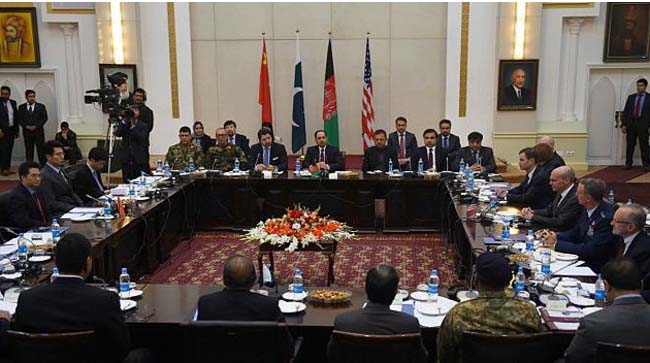The Afghan government has constantly offered an olive branch to warring factions by calling them to come to negotiating table. The establishment of High Peace Council (HPC) and officials’ persistent pushes for talk epitomize the state’s goodwill. Within the last decade, Afghan authorities knocked all doors to bring in security and protect the public rights and dignity in a society void of violence and bloodshed. With the Taliban’s downfall, the nascent democracy filled the air with a sense of hope and people dreamt of forming a utopian society.
On the contrary, the Taliban never declared a truce and kept targeting combatants and non-combatants alike heavily. The nation’s human rights were trampled upon and Taliban militants sought to impose their warped beliefs on locals, in restive districts, with the barrel of gun.
Similarly, they pressurized the government, for obtaining their political interests, through spilling the blood of innocent men, women and children. After all, the Taliban envoy who had travelled to a Kabul house that fateful night, ostensibly to discuss peace, carried a more deadly message inside his turban, which murdered the head of High Peace Council (HPC) Professor Burhanuddin Rabbani – it was a blatant ridicule and strong refusal to the government’s offer.
Despite the Taliban’s terrorist attacks and suicide bombings, which led to heavy casualties among civilians, the peace negotiation is back on the limelight.
Reportedly, a second round of four-nation talks aimed at reviving peace negotiations with the Taliban began in Kabul last Monday, even as the insurgents wage an unprecedented winter campaign of violence across Afghanistan. Delegates from Afghanistan, Pakistan, China and the United States (US) convened in the Afghan capital for a one-day meeting seeking a negotiated end to the bloody 14-year insurgency.
“There isn’t a single Afghan family that hasn’t been affected by the daily acts of brutal and deadly terrorism carried out across our cities, towns, and villages.
Our children – girls and boys – are attacked on their way to school and our mosques and public spaces are blown up all in the name of a noble religion, which in reality stands for peace and peaceful coexistence.”
Afghan Foreign Minister Salahuddin Rabbani is cited as saying. According to him, any further delay on the part of the group to join the peace talks would further isolate them in the eyes of the Afghan people, and expressed hope that the Quadrilateral Coordination Committee (QCC) would “find ways to collectively deal with those refusing to come to talks”.
However, the Taliban have not officially commented on the four-nation talks, however, section of the media quoted named Taliban leaders as saying that they would not hold talks with the Afghan government.
The Taliban leaders said they want talks with the US first to talk about an end to the invasion, removal of restrictions from their top leaders and release of Taliban detainees under the US custody.
Pakistan’s foreign affairs adviser Sartaj Aziz said that certain Confidence Building Measures can play a key role in encouraging Taliban groups to join the negotiation process, suggesting a “realistic and flexible roadmap for charting the course of action to broadly define steps and phases, but avoid unrealistic targets and deadlines.”
Regarding the heavy militancy in Pakistan and Afghanistan, he believed that the US policy-makers are responsible. He said, “The US created ‘holy warriors’ in our tribal areas during the ‘Afghan Jihad’ and then left them as soon as the war was over, a factor which contributed to decades of instability in Pakistan and the region.” Aziz’s remarks came as a reaction to the US President’s recent statement, which said that Pakistan will remain in turmoil for decades.
Barack Obama has said: “…instability will continue for decades in many parts of the world – in the Middle East, in Afghanistan, parts of Pakistan, in parts of Central America, in Africa, and Asia. Some of these places may become safe havens for new terrorist networks. Others will just fall victim to ethnic conflict, or famine, feeding the next wave of refugees.”
It is believed that Obama’s prediction about continuation of violence and terror is based on the unabated militancy and emerging of the self-proclaimed Islamic State of Iraq and the Levant (ISIL) – which has also led to a formation of “ISIL-K” in Afghan-Pak border, according to the US recent findings. After all, the terrorism has been changed into a proxy war in Syria and involved superpowers in the war.
In other words, the terrorist networks have been multiplied recently and terrorism is changed into a highly complicated issue.
The mercenary fighters are used as pawns in political games. Therefore, his prediction does not seem far from the truth and it is what the current situation demonstrates.
It is not right to make a mountain out of a molehill. Seemingly, Obama made a prediction as a political figure and everyone is entitled to do so. Now, the world and the international community have to find a panacea for the problem and mitigate the militancy in one way or another.
The delegates from China, Pakistan and the United States have convened to broker the peace talk via amicable conversation and therefore, the sore points must be avoided.
Afghanistan’s stance is clear: it has always sided with the doves and cherished hope for peace and security.
Home » Opinion » Afghanistan Sides with the Doves
Afghanistan Sides with the Doves
| Hujjatullah Zia

